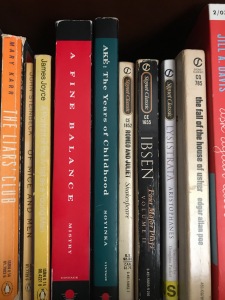 I was in a conversation recently with a friend about a few of the books I’ve recently read – specifically Samanta Schweblin’s brilliant Fever Dream and Murakami’s Men Without Women. During our conversation, she kept coming back to the same argument about her own reading habits, specifically that she wished she had the time to read. It caught me by surprise because this is a woman who seems to have more time than most to read. Indeed, she posts two or three lengthy articles a day on her social media accounts and has in fact read many non-fiction books, mostly of the self-help variety, in recent months. What she really meant to say was that she wished she had the time to read fiction, as though she placed less importance on fiction, reducing it to a cheap pleasure.
I was in a conversation recently with a friend about a few of the books I’ve recently read – specifically Samanta Schweblin’s brilliant Fever Dream and Murakami’s Men Without Women. During our conversation, she kept coming back to the same argument about her own reading habits, specifically that she wished she had the time to read. It caught me by surprise because this is a woman who seems to have more time than most to read. Indeed, she posts two or three lengthy articles a day on her social media accounts and has in fact read many non-fiction books, mostly of the self-help variety, in recent months. What she really meant to say was that she wished she had the time to read fiction, as though she placed less importance on fiction, reducing it to a cheap pleasure.
She’s not alone. In this age of content, that which is being consumed is quick information, fragments of something larger – a segment on NPR here, a podcast there, CNN soundbites from the treadmill at the gym. And while I will never be one to argue for ignorance about what is actually going on in the world, I will posit that entering the fictional world is of equal importance, never more so than today, because while the content we consume informs of us our hyper-defined identities in this digital world, it does little to change us. It’s homogenous, rooted in group-think and our evolved need to belong to a side of the aisle on every topic making the rounds. But whereas digital consumption might inform (or entertain) our preset belief systems, reading fiction can inform of us of who we really are, or who we want to be. Continue reading